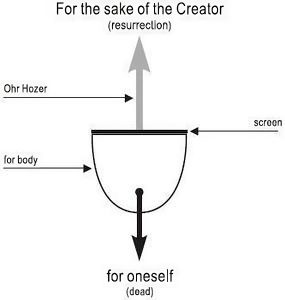 Michael Laitman, On Quora: “Why is the path to truth difficult? Is it necessary to seek the truth? Why?“
Michael Laitman, On Quora: “Why is the path to truth difficult? Is it necessary to seek the truth? Why?“
Finally in this dull, secluded village to find him gone. In the ramshackle hut by the fire sat true.
He had never seen a more old and ugly women.
– You – Really?
Old, wrinkled hag nodded solemnly.
– Tell me, I have to tell the world? What kind of message to convey?
Old woman spat into the fire and said:
– Tell them that I am young and beautiful! – Robert Tompkins, “In Search of Truth.”
This allegory states that we seek the truth, and if it is the truth, it can often appear as an old hag, while if it is a lie, then it seems beautiful. And so the question emerges: is it really necessary to seek the truth?
Yes, we need to seek and strive for the truth. The truth could indeed be very ugly, but it is the sole higher truth, above everything, and this makes it unique and worthwhile.
Can the truth be beautiful? If we see it as such, then it is a sign of blurry vision on our behalf, that we cannot see normally and we simply sell ourselves to it.
When, then, do we feel the truth? In order to feel the truth, we need to rise above and detach from our inborn egoistic qualities, which make us wish to enjoy for self-benefit at the expense of others and nature. We can then draw closer to the truth, discover it, and what we find would be our only truth.
Rising above our inborn egoistic qualities means rising above our ideas of ugly and beautiful, and where we will evaluate what we find enjoyable and unenjoyable according to completely different values.
In our egoistic desires, “enjoyable” is that which momentary fills us with pleasure for self-benefit alone, and “unenjoyable” is when we cannot receive the pleasure that we wish for ourselves. The different values that we can discover above our egoistic desires are the contrary: that “enjoyable” becomes the ability to give contentment to others and nature, and “unenjoyable” is that we do not or cannot give contentment to others and nature.
How, then, can we accept the truth?
We need to rise above ourselves in order to view the world from a higher level. We then need to understand what we seek, where we are and where this truth we seek should be.
Likewise, we require much courage to seek and not deviate from the path to truth. According to our egoistic nature, we run away from such a search, and we thus need to feel a certain compulsion in order to embark on the path of truth, and to stay directed at it.
And what truth do we seek?
It is the meaning of life.
We can discover, achieve, reveal, understand, evaluate and feel the meaning of life if we rise above ourselves.
What does it mean, to “rise above ourselves”? It means first that we stop evaluating everything based on our personal tastes and understandings, the myriad evaluative systems we have in our egoistic intellect and sensation.
The difficulty in achieving the truth is thus due to the need to rise above our very selves, the “I” of the person. If we fail to do so, then we will always be under the thumb of our egoistic desires, which feed us with constant lies and which hold us at an infinite distance from the truth.
Yet despite the incredible difficulty in attaining the truth, more and more people feel an attraction to it and are willing to undergo various searches and efforts in order to find it. We have to be prepared for the fact that the truth is an old ugly hag though, according to the above allegory. And we can agree to that precisely because it is the truth.
[317758]

Based on KabTV’s “News with Dr. Michael Laitman” with Kabbalist Dr. Michael Laitman and Semion Vinokur on July 17, 2023. Written/edited by students of Kabbalist Dr. Michael Laitman.
Photo by Sinitta Leunen on Unsplash.
Filed under: Q&A, Quora - No Comments →
 Michael Laitman, On Quora: “What does the resurrection of the dead mean?“
Michael Laitman, On Quora: “What does the resurrection of the dead mean?“















